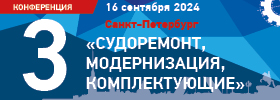Peter Likhachev, Marine Commercial Director at Bureau Veritas in St. Petersburg: I see no alternative to LNG as marine fuel
Peter Likhachev, Marine Commercial Director at Bureau Veritas in Saint-Petersburg, tells IAA PortNews about prospects of alternative marine fuels, regulations on the use of scrubbers and plans of Bureau Veritas concerning its development in Russia.
- Mr. Likhachev, could you, please tell about the plans of Bureau Veritas on the development of rules for the use of eco-friendly marine fuels?
- I would take a roundabout approach to the subject. The interest to clean energy has multiplied this millennium both in terms of reduction of hazardous emissions and in terms of supply of remote territories with this energy. Such territories include islands and remote areas like Arkhangelsk Region which cannot be supplied by conventional ways via pipelines. Here we speak about liquefied natural gas (LNG) as the optimal eco-friendly fuel.
Bureau Veritas has been dealing with transportation of liquefied gas from early 60-ies when the gas storage and transportation system using membrane-type tanks was first developed. Bureau Veritas was a pioneer in lots of innovations related to gas transportation. Those were the first ships with regasification units able for ship-to-shore supply of gas and multipurpose gas carriers with electric propulsion converting the energy of liquefied gas into the electric power.
As for our participation in promotion of LNG as fuel it should be mentioned that regulatory documents have already been elaborated. They regulate the process of fuel transfer and set requirements for systems being used with the liquefied gas. We work closely with IMO and maritime authorities of different states in order to introduce their recommendations.
We are generally prepared for that, the regulatory framework is ready and now we expect the respond from the industry which is to use that. Few vessels actually use liquefied gas as marine fuel which is supplied from tank trucks. We expect (and we see the expected tendency) that bunkering vessels will appear soon and will fuel vessels directly in the sea. Unfortunately, there are not many of them today. Actually, bunkering tankers have not been built yet.
Bureau Veritas is prepared for providing services on ensuring safe and reliable operation of gas powered vessels.
- What other fuels, except for LNG, are considered by Bureau Veritas experts as promising ones?
- There are no alternatives. The old systems which cannot be ignored may be further used with the devices reducing hazardous emissions. But I see no crucial alternative to LNG fuel.
- Are there regulations for the use scrubbers or disposal of their waste, for their safe application?
- Bureau Veritas has issued a special brochure: Exhaust Scrubbers – What you need to know. It describes handling of exhaust scrubbers. Besides, we have introduced new requirements on fitting and using scrubbers.
I know that many ship owners including those without BV class address us and we try to help them in issues related to scrubbers. The same approach is pursued by manufacturers of diesel engines, two-stroke diesels with this or that configuration. We have a regulatory framework allowing for re-equipment complying with the safety and environment protection requirements.
- DNV has developed an LNG-ready class notation for vessels which can be easily equipped with LNG fuel system. Is Bureau Veritas going to propose anything like that?
- We want to do something like that but our own. We have already developed two notations LNG-convertible and LNG-prepared, one of them will be approved. It is a formal procedure: the proposals have already been forwarded to the company’s notation committee which is to approve the notation in the nearest time. I would like to tell more about technical aspects of this notation. It will include regulations on the position of LNG tanks and bunkering station, position and structure of equipment for processing, determination of explosion hazard zones, safety systems, gas analyses etc. I mean we have all these already, it is time to have it introduced. So we do not lag behind.
- What are the future challenges of shipbuilding and shipping industries?
- One could speak for a long time about it but I would just repeat: environment protection and energy efficiency for both industries.
- What are your plans on the development in Russia. Do you interact with Russian Maritime Register of Shipping?
- Certainly. Working in Russia we consider RS as our partner. This has been confirmed many years ago by our agreements. We have been working together in IACS and working groups of this Association. We also cooperate in large-scale projects, like it was with Shtokman project which has unfortunately been suspended. We will supervise the construction of Arctic gas carriers. As of today, the brightest example of our cooperation is our joint participation in Yamal LNG project with designing and construction of fifteen Arctic class 170,000 cbm LNG carriers according to РС/BV classification. Such vessels have not been built before.
Interviewed by Irina Denisova






